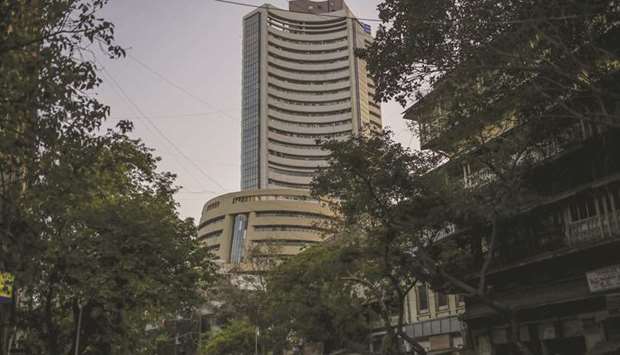Indian stocks soared as trading resumed after a holiday, outpacing gains in equities across Asia, on optimism that the deadly coronavirus pandemic may be waning in some key global hot spots.
Tracking strong global markets, Indian equities rallied yesterday with the Sensex ending 2,476 points higher at 30,067, its biggest one-day gain in percentage terms in over 10 years.
China said it didn’t have any new deaths for the first time since the pandemic emerged, while New York Governor Andrew Cuomo said the virus-related fatality rate was effectively flat for two days.
“We are drawing cues from the global markets where the pace of new cases has reduced and the worst appears to have been factored in,” said Umesh Mehta, head of research at Mumbai-based Samco Securities Ltd. “There is also the possibility of government stimulus for sectors.”
The infection curve has yet to flatten in India, however. A total of 4,778 people in India have been infected with 136 deaths, according to data compiled by John Hopkins University. The nation is also seeing a sharp uptick in infected cases as the administration ramps up daily testing. A lock-down through April 14 was imposed to try preventing transmission of the virus in the world’s second most populous country.
“Market participants are now focusing on the peak of the pandemic even as economic conditions have worsened,” said Chokkalingam G, head of investment advisory at Equinomics Research & Advisory in Mumbai. “A three-week lockdown means no business activity for a quarter of a three-month period, which will have a substantial impact on earnings.”
Trading volumes have fallen and volatility remains high with most dealers working from home with limited flexibility. The Nifty index closed at 8792.2 yesterday and Abhimanyu Sofat, head of research at IIFL Securities Ltd., said more positive news on the domestic front regarding the virus is needed for the gauge to surge past the 9,000 level.
Sovereign bonds were lower as states ramped up debt supply during the week. The benchmark 10-year bond yield was up 11 basis points to 6.42%. The rupee advanced 0.7% against the dollar.
Bond and currency markets yesterday began reduced trading hours from between 10 am-2 pm in Mumbai until April 17 due to market volatility, the Reserve Bank of India said last week.
The disruption has already beginning to show signs of pain. Lender Bajaj Finance, said in an analyst call on Monday that the company has lost Rs47.5bn ($625mn) in assets under management in the last 10 days, BloombergQuint said in a report.
The firm also said that small and medium -sized businesses were under severe strain and asked the central bank to consider further economic relief measures, according to the report.
Companies will start announcing their results for the January-March quarter this month. Kotak Institutional Equities expects a 14% decline in profits for the companies under its coverage with a double-digit drop in net income for sectors like autos and construction material as economic activities suffered in March.
Meanwhile the rupee rose against the US dollar yesterday, tracking sharp gains in the domestic equity markets. The rupee yesterday settled at 75.63 against the US dollar, as compared to the previous close of 76.13 against the US dollar.
The forex market was closed on Monday on account of Mahavir Jayanti. During yesterday’s trade, the rupee traded between 75.57 and 75.99. The Sensex was up about 8% or about 2,400 points in late trade.
From yesterday, the new market trading hours for both bonds and foreign exchange came into effect. The Reserve Bank of India (RBI), in an unprecedented move, has cut market trading hours for both bonds and foreign exchange to four hours, citing possible operational and logistical risks arising from the nationwide lockdown due to the Covid-19 outbreak.
Global equity markets extended gains yesterday on signs of a slowdown in the spread of the coronavirus in key hotspots and some governments began making plans to ease restrictions. While the mood is a little better on trading floors, analysts remained cautious.
So far this year the rupee is down about 6% so far this year against the US dollar, weighed down by strong outflows from Indian markets, particularly in the month of March.
Foreign portfolio investors (FPIs) have net withdrawn a record Rs1.1 lakh crore from the Indian equity and bond markets in March as the coronavirus pandemic dented investor sentiment worldwide.
Global oil prices today rose on hopes that the world’s biggest producers of crude will agree to cut output as the coronavirus pandemic crushes demand, even as analysts warn a global recession may be deeper than expected and big production cuts will be needed. Brent crude was up 2.4% at $33.85 a barrel.

The Bombay Stock Exchange building in Mumbai. The Sensex closed up 2,476 points to 30,067 yesterday, its biggest one-day gain in percentage terms in over 10 years.
